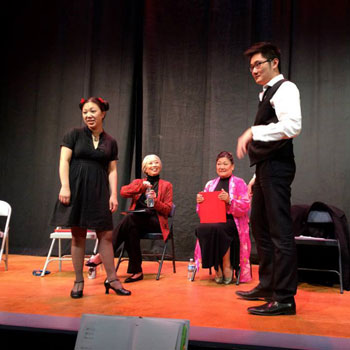PopRock Blog
I remember when I was a kid, I dreaded going back to school. The first day of school signals not only the end of summer fun, but the beginning of endless amount homework.
But with performing arts, students get a chance to nurture their creative side that will break up the monotony of their academic works, which in turn will make them better students and able to better handle everything else they do. Many scientific studies have shown that students who participate on a regular basis in a creative endeavor do better overall in other subjects in school.
The creative studies should be an integral part of every student's education. Allowing our brains to work in creative ways very often translates to students finding creative ways to solve problems in other areas of their lives. Different areas of performing arts studies will also provide students with additional skills such as public speaking, listening, improved mathematics and conceptual learning and more. Don't underestimate the power of what art can do in your child's life.

By Paul Kwo
“If you can see yourself doing anything else, go and do it.” These were the words of so many of my performing arts teachers, mentors and coaches in my journey into a performing arts career. But it's not just applicable for those who wishes to pursue a professional career. It actually is applicable for anyone who wants to study performing arts.
Whether a student is studying an instrument, or voice, dance or acting, it is vitally important that they enjoy the process. Certainly young children and teenagers would most often prefer to play with their friends, watch a movie or other forms of entertainment then commit long hours of practice time into their craft. But even in those cases, the desire to grow artistically has to be innate in the student in order for them to succeed. Whether they put in 1 minute or 10 hours a week, without the love of the craft, students will simply grow their dislike of the art forms they study. Simply put, if they cannot see themselves ever enjoying the fruits of their labor, then they should be doing something else. A student must be able to say at some point or another they do actually enjoy the art from despite hating the practice time involved.
How does competition versus performance come into play?
There are lots of dance and music competitions around. From concerto competitions for various musical instruments, to singing competitions, classical ballet competitions to hip hop and break dancing dance offs, competitions are all around. They foster a competitive environment between students. There are positives and negatives to this. Obviously for winners, the winnings often build self-confidence and assurance. It also encourages others to strives for better the next time around. But the problem far out weights the positives.
Competitions are only for the seasoned performer with a very strong will. For most, competitions too early on can create a negative sense of self-ability. It makes a student feel inadequate when they loose. Sure we all tell our students not to put too much emphasis on winning, but it is impossible to not feel bad on some level when we return home empty-handed. Then there are those competitions that gives out trophies to everyone, even simply for participating, completely void of any meaning in the awards. Students see through these meaningless trophy and the effects are still the same. Many students find such harsh competitions causing them to loose interest in their love of the art.
Instead at PopRock Academy in Alhambra, we focus on performance. Certainly we don't write off competitions completely. If a student is absolutely ready both technically and mentally, we will support their dreams of competiting and winning. But performance opportunities are far more valuable than competitions. Ultimately we learn performing arts to perform. It is not a competition, but rather a collaboration. It is about working together to create something better, something meaningful. Having plenty of performing opportunities if far more important than having plenty of competition opportunities.
Performances builds self-confidence just as competitions can, but without the added stress of having to win and beat out the other students. It is about the sharing of music, dance or theatre. It is about showcasing our best and supporting each other to do the same. It is about a community of performers gathering and growing together as a group. Performing arts is hard, and artistic expression often requires vulnerability. Performance opportunities provides students the opportunities to continually express themselves without feeling a sense of lose. When students have an entire time table of performance opportunities lined up, they know if they mess up today, they always have tomorrow to try again. At every performance, students gain an opportunity to learn from their mistake, because face it, there are no such thing as a perfect performance.
So let's create more performance opportunities for our students to enjoy, to learn and to grow. Share your love for the arts with performances. Support your fellow students as we are all in this together. There is room for us all in the arts and we should help build everyone up, not tear each other down.
PopRock Academy is located in the San Gabriel Valley. We serve the cities of Alhambra, San Marino, South Pasadena, San Gabriel, Temple City, Arcadia, Monterey Park, Rosemead, El Monte, Highland Park, Eagle Rock, Montebello, Monorovia, Altadena and downtown Los Angeles.

